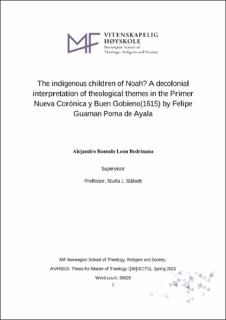| dc.description.abstract | This research study aims to examine a theological defense of the oppressed natives of the Andes after the consolidation of the Spanish Empire in South America between the end of the sixteenth and the early seventeenth centuries. During the post-colonial era, natives, creoles, the Incas, and Spaniards constituted the colonial society. However, the Andean natives became subjects of the colonial system and the church and were accused of idolatrous religiosity. The claim for restitution and emancipation was presented through the manuscript, the Primer Nueva Corònica y Buen Gobierno(the First New Chronicle and Good Government ), written by the Andean writer Felipe Guaman Poma, Ayala (Ca.1530/1550-after1615). His manuscript proposed political reforms under the Christian principles. Particularly, this thesis focuses on the interpretation of theological themes of the Guaman Poma`s chronicle. It argues that we in Guaman Poma de Ayala`s text find a decolonial theology with a medieval character that applies the indigenous ideology as a tool to reinterpret and create a parallel line between the Christian history and local history of the Andes.
My work analyzes Guaman Poma`s theological themes from the decolonial understanding and the indigenous logic that seems to employ the biblical references to revalue the indigenous identity in the framework of Western Christianity. His experience as a good Christian and an Andean native becomes indispensable for his proposal to protest the Spanish colonial system that increased the margination of the indigenous population and dismantled the native cultural identity. In that sense, my analytical description reveals Guaman Poma`s reinterpretation of the indigenous belief with a Christian background, referring to their values and Christian principles and the notion of monotheist God as the inheritance of their ancestors. Besides, the ancient indigenous generations were God`s descendants in the indigenous kingdom of Peru. Hence, the indigenous people were in the same category as were Western Christian people. | en_US |
